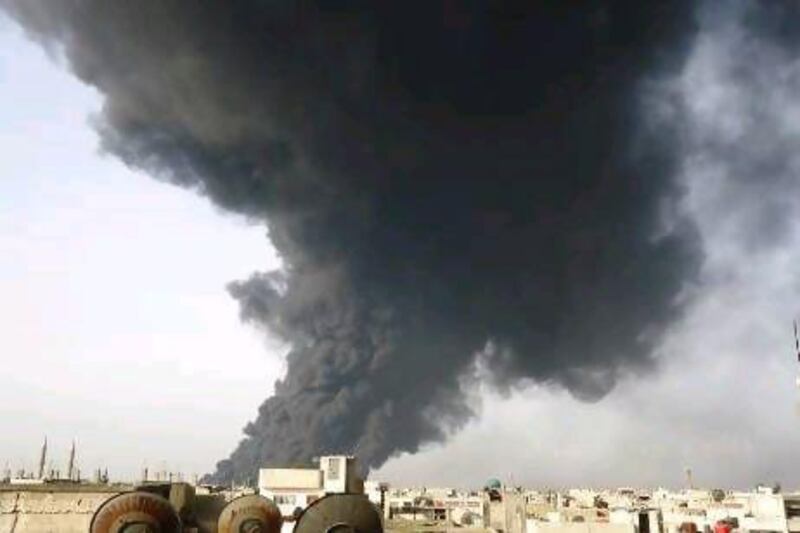DAMASCUS // The Syrian president Bashar Al Assad yesterday called a referendum on a new "democratic" constitution that could allow him to rule Syria until 2028 and beyond.
Extracts of the proposed constitution published in state media said it would establish rule of law and an independent judiciary, with freedom a "sacred right" and equality and social justice enshrined for all citizens.
It also proposes ending the five-decade monopoly enjoyed by the Baath Party and replacing it with a multi-party system in which "power is practised democratically through voting".
Protests would remain illegal unless given advance permission by the interior ministry.
Future presidents would be limited to two seven-year terms of office, although that may be extended if no successor as president is actually elected.
Under those terms, Mr Al Assad, 46, who has already ruled Syria for more than 11 years, would legally be able to hold on to his office for another 14 years or more.
It is not clear if the president, who is serving his second term, would be able to run for another two terms or whether he would have to stand down when his current one ends in 2014. His father and predecessor, Hafez al Assad, ran Syria for three decades.
Scheduled for February 26, the national referendum raises serious questions about how it can be administered on the ground. Its provisions also require parliamentary elections before the end of May.
Armoured military units are continuing operations across large parts of the country, including Homs, Deir Ezzor, Idleb, Palmyra and Deraa, as the government struggles to maintain control in the face of a growing, and increasingly armed, rebellion.
Armoured vehicles and heavy shooting were reported in the Damascus neighbourhood of Barzeh yesterday, a focal point for protests in which defecting soldiers in the Free Syrian Army have been standing guard for demonstrators.
The Local Coordination Committees, a network of grassroots activists, said 22 people were killed yesterday. Human-rights groups say the death toll since the uprising began in March stands at 7,000.
The Syrian government, which maintains it is fighting a foreign-backed insurgency and not a pro-democracy uprising, says more than 2,000 security personnel have been killed by "terrorists".
Baath party officials have admitted a recent municipal ballot produced a dismal turnout in protest areas, despite public pronouncements that participation was high. Opposition groups called a widely observed boycott of those elections and are likely to do the same if the constitutional referendum is held.
Insecurity has only increased since those municipal ballots, to the degree that health workers say government-run inoculation programmes for children have been halted in many areas in what they said was a signal the machinery of state was shutting down.
Mr Al Assad has made the rewritten constitution a centrepiece of his reform agenda, and the announcement that it is to be put to a vote was welcomed by Russia, his major ally, as a sign that real political change is under way in Syria.
Opposition groups ridiculed the suggestion. “Democratic states do not send tanks out to kill the electorate,” said a leading opposition figure in Damascus. “This regime is not serious about democracy, it is serous about clinging to power whatever the cost.”
Anwar Al Bunni, a prominent human-rights lawyer, said a new constitution was irrelevant. “We already have a constitution that on paper guarantees rule of law and creates rights and freedoms, the problem is that this regime completely ignores it. They will do the same with the new constitution.”
The United States dismissed the proposed referendum. “It’s actually quite laughable – it makes a mockery of the Syrian revolution,” the White House spokesman Jay Carney said.“Promises of reforms have usually been followed by an increase in brutality and have never been delivered upon by this regime since the beginning of peaceful demonstrations in Syria.”
Tunisia, which is due to host a “Friends of Syria” conference next week, said it would use the event to press for major political reform.
“We need to send a strong message to the Syrian regime that they have to stop the open killing of innocent and civilian people,” the Tunisian foreign minister Rafik Abdesalem said in Lisbon.
Members of the Arab League, the European Union, the US, China, and Russia have been invited to attend the February 24 meeting.





